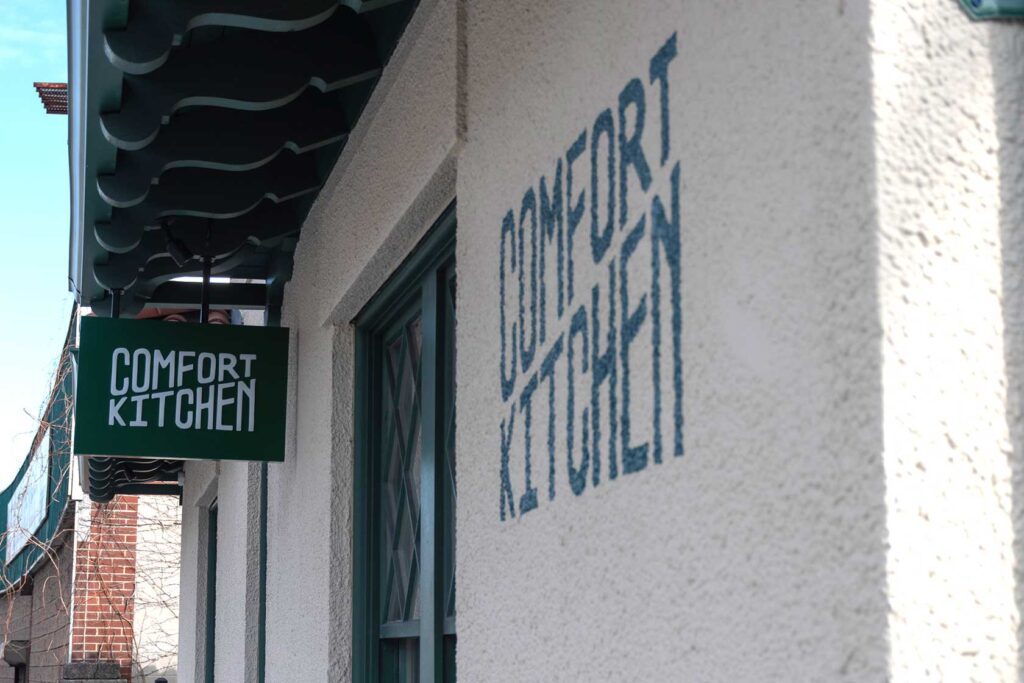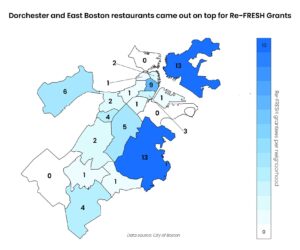
New city funding to 66 local restaurants and food industry businesses aims to bolster an industry that faced unique challenges during the COVID-19 pandemic.
The $500,000 in funding, from a federal pandemic relief package, was announced earlier this month as the first of two rounds of grant funding in the city’s Revitalization of Food Restaurants and Establishments to Stabilize Holistically — or Re-FRESH — program.
“The Re-FRESH program is about how are we going to revitalize these restaurants and food establishments so they’re no longer struggling and they’re thriving” said Aliesha Porcena, director of Boston’s Office of Small Business Development, the city team administering the grant.
The program was first announced by Mayor Michelle Wu in November, allocating $1 million in total from the federal pandemic relief funding through two rounds of grants. That city support is intended to go towards business needs like payroll, rent, inventory and other fixed expenses.
In the first round of funding, awards ranged from $2,000 to $15,000.
When it came to grant awardees, Dorchester came out on top, with 13 of the restaurants winning the city’s grant funding calling the neighborhood their home. East Boston had the same count, with downtown Boston, Allston/Brighton and Roxbury rounding out the top five.
Key to the program, Porcena said, is technical assistance efforts to go along with the grant funding. The city is partnering with PrepShift, a Boston-based company that coaches food industry businesses to improve operations.
The choice to include the focus on supporting planning came from pandemic-era lessons, when Porcena said they would give out funding to support businesses in the food industry only to have the same businesses coming back months later saying they needed more.
“What that told us was there wasn’t a plan with the grant, there wasn’t a plan with the funding,” she said. “We wanted to make sure to course-correct that this time, to make sure businesses who receive the grant have an idea of what is the best decision for that grant money.”
It’s a piece that Irene Shiang Li, executive director of PrepShift, says is important to make sure the funding actually helps — and doesn’t end up hurting — the small businesses that receive it.
“Sometimes, having some money fall into your lap can just let you get into more trouble,” Li said. “If you were to receive a grant of $5,000 or $10,000 or $15,000 there, there are probably 10 things you could do with it. And depending on the stage that your business is in and the health of your business, some of those could actually backfire.”
That technical assistance will take the form of steps like a diagnostic assessment, a report informed by an in-depth interview to identify where a business stands in terms of development and maturity on a five-point scale from “unsustainable” to “optimizing.” Li said most fall somewhere in the middle.
That score will then inform next steps, with one-on-one assistance or attending workshops on things from food cost and menu design to taxes and accounting. Porcena said those workshops, which are largely run virtually, are open to any food industry business, regardless of whether they received a grant or not.
Adding additional support to make sure city funding is effective is an ongoing priority for the Office of Small Businesses, Porcena said.
“You don’t only get a grant, but you get a grant and a plan,” she said. “That’s what we’re trying to do with all of our work, is really make sure that we are creating sustainability among businesses and with businesses to make sure that they have a plan moving forward.”
Given the cost of food industry operations, none of the awards — up to $15,000 — are enormous.
An early 2020 article on the dining and food website Eater about Mei Mei, Li’s dumpling then-restaurant — the pandemic precipitated a closure and shift into becoming a dumpling factory — reported that annual direct operating costs clocked in above $32,000, before having to consider maintenance costs, rent or salaries.
And some of those bigger awards also went to a handful of businesses with more than one location, so funds could support both stores, Porcena said.
But for businesses behind on rent and hoping to chip away at those costs, or looking to upgrade software or hardware in their facilities, or expand advertising, or hire a professional bookkeeper, the city funding could be an important step, Li said.
“In some ways, it’s not a lot of money, and in some ways, if you’re really smart about how you spend it and you line that up with your priorities, it can make a huge difference,” she said.
The grants and support are intended to support an industry that has always had unique challenges, one that was uniquely impacted during the COVID-19 pandemic, Li said.
According to the National Restaurant Association, by the end of 2020, more than 110,000 restaurants were closed permanently or long-term. That report, the result of a national survey, found that 87% of full-service restaurants were reporting a 36% drop in sales revenue.
Li said some of that comes from the highly competitive nature of the industry. On any main street there’s likely to be dozens of restaurants, all vying for the same customers. When the pandemic hit, businesses that had been able to achieve success without embracing technology or more formal businesses systems were left to work double time to catch up as they had to adjust to things like online ordering.
On top of that, she said that, while many people are eager to help restaurants, knowledge of how to do so is often missing.
“I think the piece that we sometimes feel is missing is having the right people who know how to actually help restaurants,” Li said.
That kind of specialized knowledge is what her company works to provide — PrepShift also does work with Cambridge and Lowell — and that she said will be important to make Boston’s grant funding effective.
“We hope that with our experience and also with just an outside perspective, we can help people be really smart about [prioritizing], so that they don’t spend their money on something that is perhaps more appropriate for a larger or more developed business, or for a business that has its expenses more in line,” Li said.
The city re-opened the grant for the second round of funding at the end of July. When they did, they expanded the requirements for businesses, making the caps on which small businesses qualified for funding higher.
In this new round, for which applications are due Sept. 13, they increased the maximum number of employees for a business to be eligible from 25 to 30, and raised the limit on annual revenue from $2 million to $3 million.







